Using Games to Promote Academic Integrity and Prevent Plagiarism
VerifiedAdded on 2023/06/16
|5
|773
|88
Presentation
AI Summary
This presentation details a game-based approach designed to promote academic integrity and prevent plagiarism among university students. The game, structured as a board game, challenges students to answer questions related to academic misconduct and collaboration, encouraging teamwork and critical thinking. By correctly answering questions, students advance towards the board's end, reinforcing the importance of honesty and integrity in academic work. The instructor acts as a facilitator, guiding students to understand and internalize the principles of academic integrity. The presentation emphasizes the necessity of academic honesty for generating original ideas and achieving professional success, advocating for universities to implement strong academic integrity policies and consequences for misconduct. The game aims to engage students in learning about ethical academic practices, making integrity a habit in their daily activities.
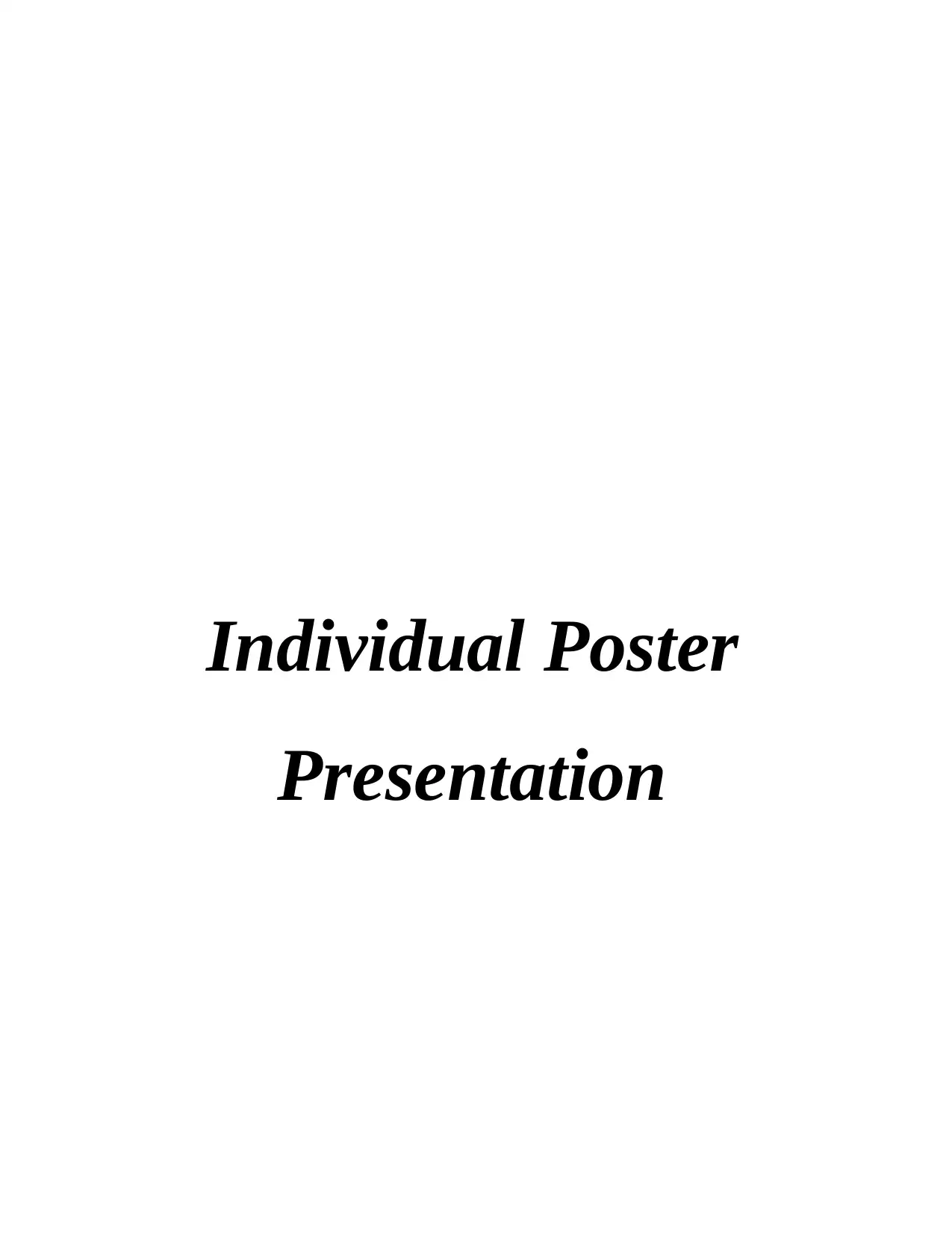
Individual Poster
Presentation
Presentation
Paraphrase This Document
Need a fresh take? Get an instant paraphrase of this document with our AI Paraphraser
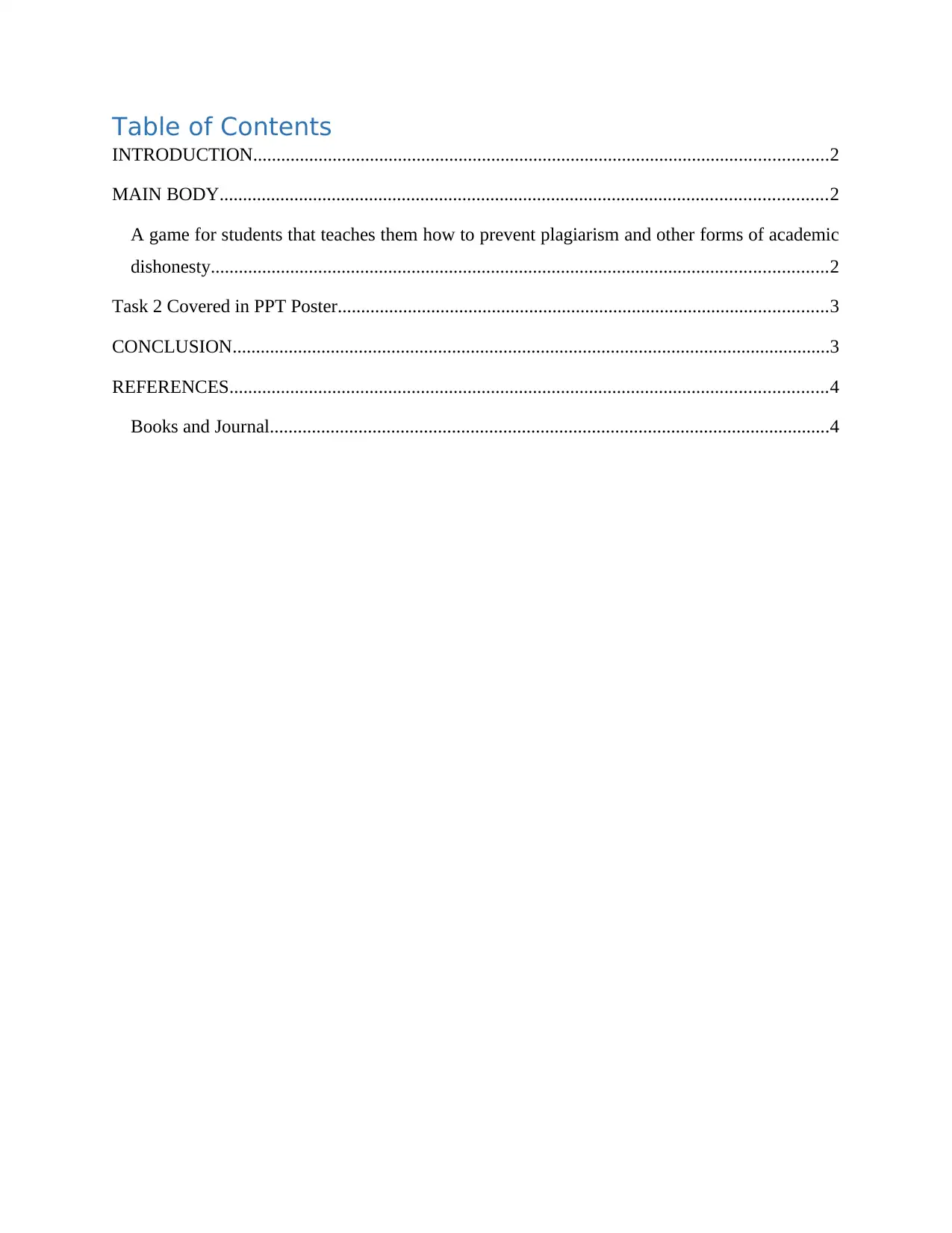
Table of Contents
INTRODUCTION...........................................................................................................................2
MAIN BODY..................................................................................................................................2
A game for students that teaches them how to prevent plagiarism and other forms of academic
dishonesty....................................................................................................................................2
Task 2 Covered in PPT Poster.........................................................................................................3
CONCLUSION................................................................................................................................3
REFERENCES................................................................................................................................4
Books and Journal........................................................................................................................4
INTRODUCTION...........................................................................................................................2
MAIN BODY..................................................................................................................................2
A game for students that teaches them how to prevent plagiarism and other forms of academic
dishonesty....................................................................................................................................2
Task 2 Covered in PPT Poster.........................................................................................................3
CONCLUSION................................................................................................................................3
REFERENCES................................................................................................................................4
Books and Journal........................................................................................................................4
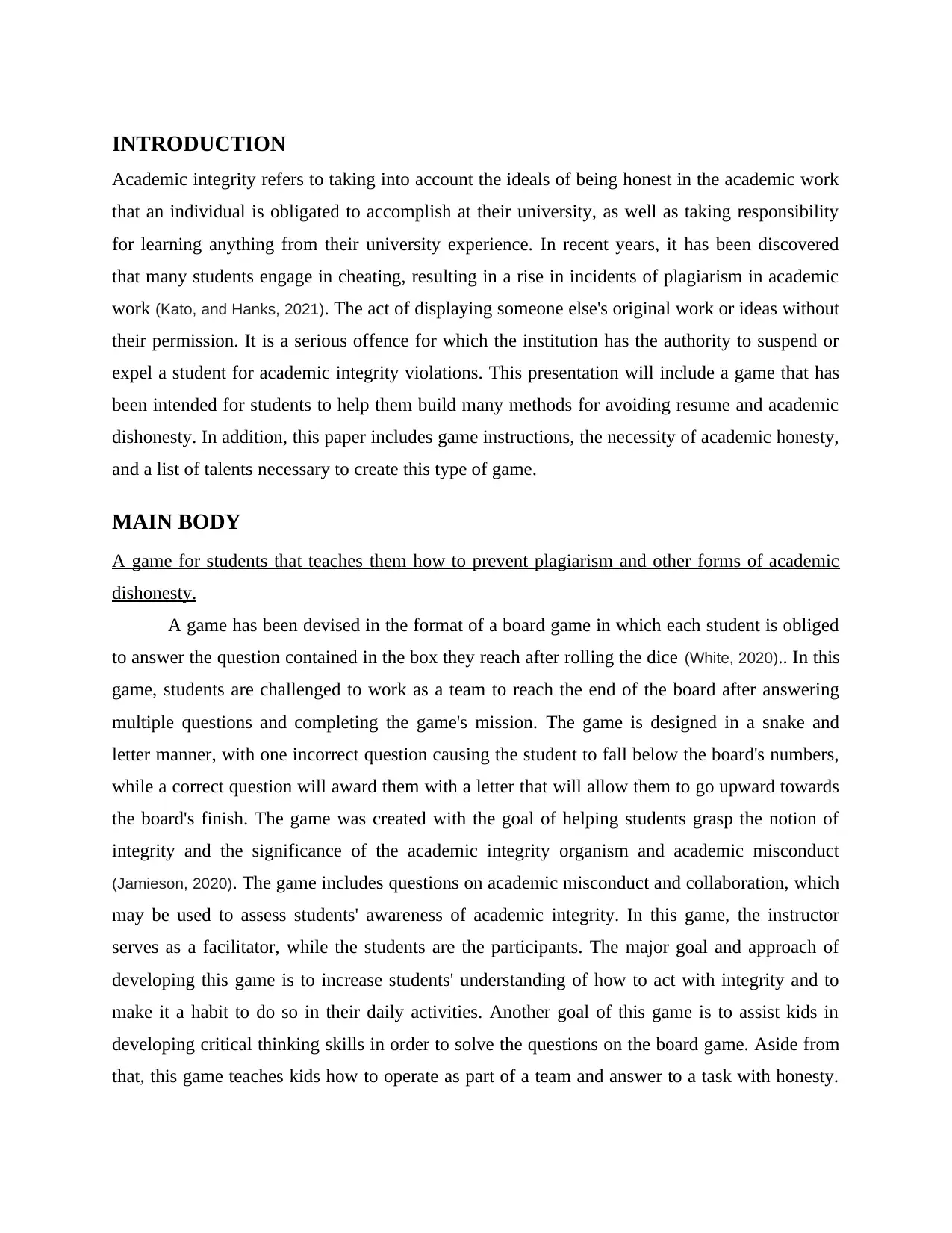
INTRODUCTION
Academic integrity refers to taking into account the ideals of being honest in the academic work
that an individual is obligated to accomplish at their university, as well as taking responsibility
for learning anything from their university experience. In recent years, it has been discovered
that many students engage in cheating, resulting in a rise in incidents of plagiarism in academic
work (Kato, and Hanks, 2021). The act of displaying someone else's original work or ideas without
their permission. It is a serious offence for which the institution has the authority to suspend or
expel a student for academic integrity violations. This presentation will include a game that has
been intended for students to help them build many methods for avoiding resume and academic
dishonesty. In addition, this paper includes game instructions, the necessity of academic honesty,
and a list of talents necessary to create this type of game.
MAIN BODY
A game for students that teaches them how to prevent plagiarism and other forms of academic
dishonesty.
A game has been devised in the format of a board game in which each student is obliged
to answer the question contained in the box they reach after rolling the dice (White, 2020).. In this
game, students are challenged to work as a team to reach the end of the board after answering
multiple questions and completing the game's mission. The game is designed in a snake and
letter manner, with one incorrect question causing the student to fall below the board's numbers,
while a correct question will award them with a letter that will allow them to go upward towards
the board's finish. The game was created with the goal of helping students grasp the notion of
integrity and the significance of the academic integrity organism and academic misconduct
(Jamieson, 2020). The game includes questions on academic misconduct and collaboration, which
may be used to assess students' awareness of academic integrity. In this game, the instructor
serves as a facilitator, while the students are the participants. The major goal and approach of
developing this game is to increase students' understanding of how to act with integrity and to
make it a habit to do so in their daily activities. Another goal of this game is to assist kids in
developing critical thinking skills in order to solve the questions on the board game. Aside from
that, this game teaches kids how to operate as part of a team and answer to a task with honesty.
Academic integrity refers to taking into account the ideals of being honest in the academic work
that an individual is obligated to accomplish at their university, as well as taking responsibility
for learning anything from their university experience. In recent years, it has been discovered
that many students engage in cheating, resulting in a rise in incidents of plagiarism in academic
work (Kato, and Hanks, 2021). The act of displaying someone else's original work or ideas without
their permission. It is a serious offence for which the institution has the authority to suspend or
expel a student for academic integrity violations. This presentation will include a game that has
been intended for students to help them build many methods for avoiding resume and academic
dishonesty. In addition, this paper includes game instructions, the necessity of academic honesty,
and a list of talents necessary to create this type of game.
MAIN BODY
A game for students that teaches them how to prevent plagiarism and other forms of academic
dishonesty.
A game has been devised in the format of a board game in which each student is obliged
to answer the question contained in the box they reach after rolling the dice (White, 2020).. In this
game, students are challenged to work as a team to reach the end of the board after answering
multiple questions and completing the game's mission. The game is designed in a snake and
letter manner, with one incorrect question causing the student to fall below the board's numbers,
while a correct question will award them with a letter that will allow them to go upward towards
the board's finish. The game was created with the goal of helping students grasp the notion of
integrity and the significance of the academic integrity organism and academic misconduct
(Jamieson, 2020). The game includes questions on academic misconduct and collaboration, which
may be used to assess students' awareness of academic integrity. In this game, the instructor
serves as a facilitator, while the students are the participants. The major goal and approach of
developing this game is to increase students' understanding of how to act with integrity and to
make it a habit to do so in their daily activities. Another goal of this game is to assist kids in
developing critical thinking skills in order to solve the questions on the board game. Aside from
that, this game teaches kids how to operate as part of a team and answer to a task with honesty.
⊘ This is a preview!⊘
Do you want full access?
Subscribe today to unlock all pages.

Trusted by 1+ million students worldwide
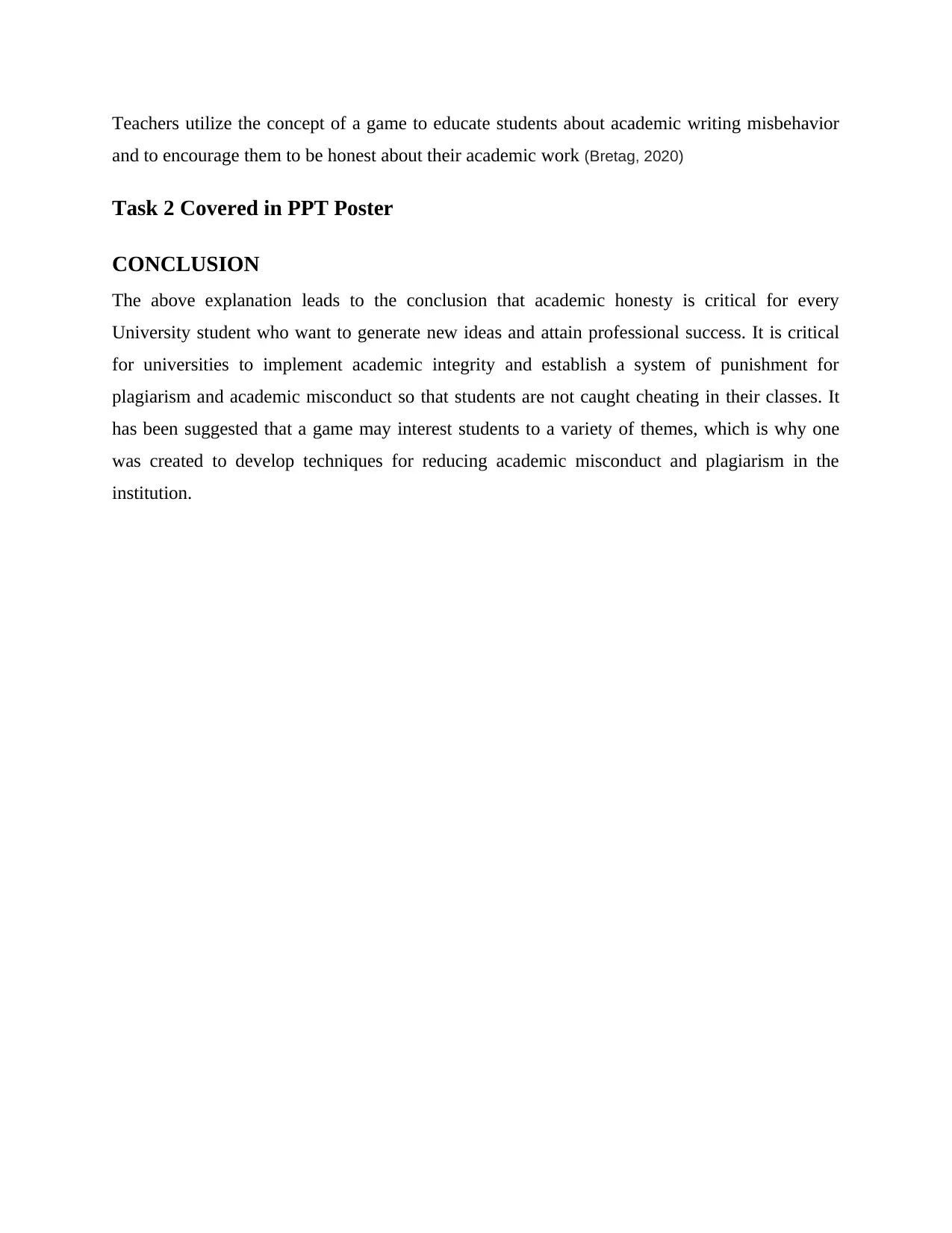
Teachers utilize the concept of a game to educate students about academic writing misbehavior
and to encourage them to be honest about their academic work (Bretag, 2020)
Task 2 Covered in PPT Poster
CONCLUSION
The above explanation leads to the conclusion that academic honesty is critical for every
University student who want to generate new ideas and attain professional success. It is critical
for universities to implement academic integrity and establish a system of punishment for
plagiarism and academic misconduct so that students are not caught cheating in their classes. It
has been suggested that a game may interest students to a variety of themes, which is why one
was created to develop techniques for reducing academic misconduct and plagiarism in the
institution.
and to encourage them to be honest about their academic work (Bretag, 2020)
Task 2 Covered in PPT Poster
CONCLUSION
The above explanation leads to the conclusion that academic honesty is critical for every
University student who want to generate new ideas and attain professional success. It is critical
for universities to implement academic integrity and establish a system of punishment for
plagiarism and academic misconduct so that students are not caught cheating in their classes. It
has been suggested that a game may interest students to a variety of themes, which is why one
was created to develop techniques for reducing academic misconduct and plagiarism in the
institution.
Paraphrase This Document
Need a fresh take? Get an instant paraphrase of this document with our AI Paraphraser
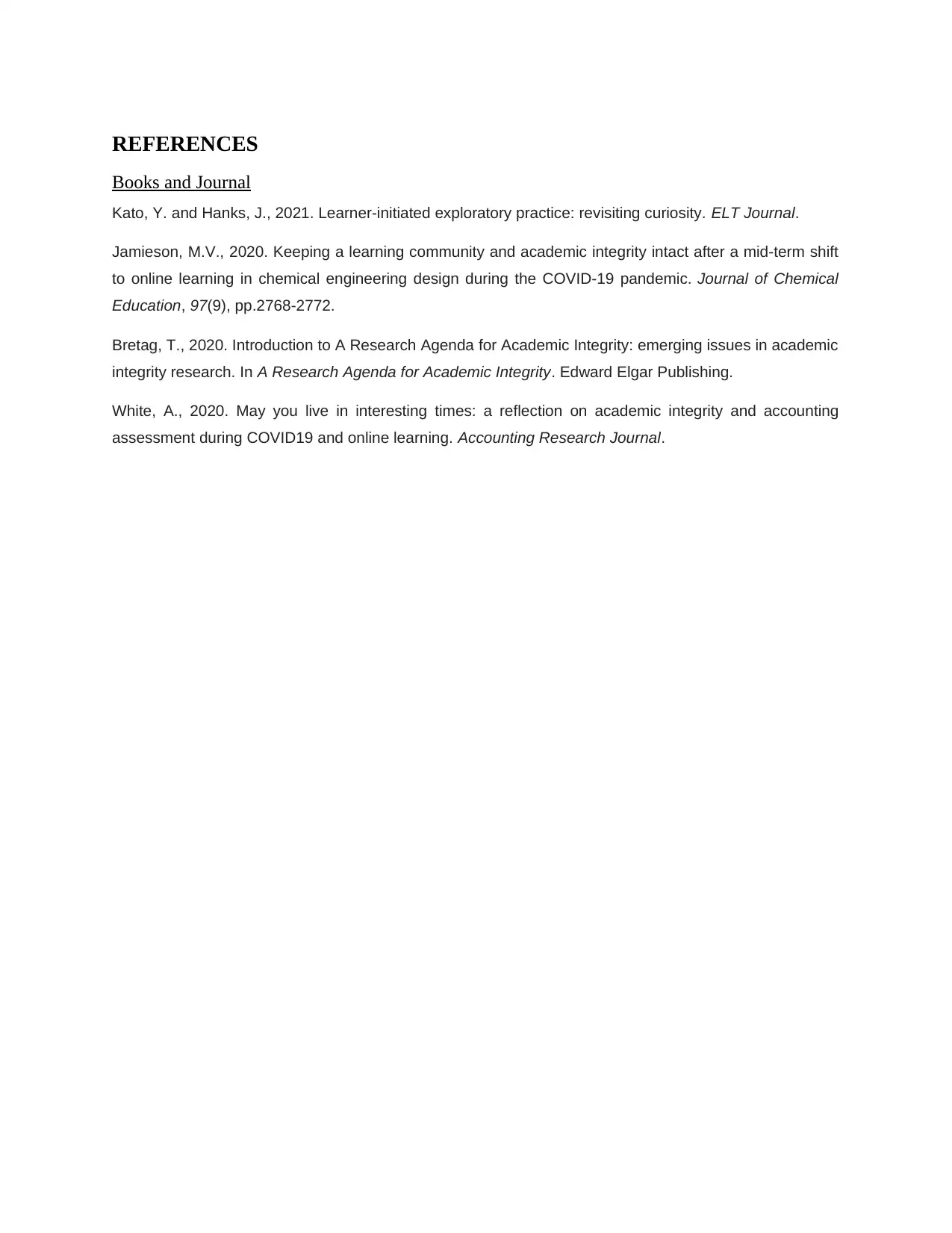
REFERENCES
Books and Journal
Kato, Y. and Hanks, J., 2021. Learner-initiated exploratory practice: revisiting curiosity. ELT Journal.
Jamieson, M.V., 2020. Keeping a learning community and academic integrity intact after a mid-term shift
to online learning in chemical engineering design during the COVID-19 pandemic. Journal of Chemical
Education, 97(9), pp.2768-2772.
Bretag, T., 2020. Introduction to A Research Agenda for Academic Integrity: emerging issues in academic
integrity research. In A Research Agenda for Academic Integrity. Edward Elgar Publishing.
White, A., 2020. May you live in interesting times: a reflection on academic integrity and accounting
assessment during COVID19 and online learning. Accounting Research Journal.
Books and Journal
Kato, Y. and Hanks, J., 2021. Learner-initiated exploratory practice: revisiting curiosity. ELT Journal.
Jamieson, M.V., 2020. Keeping a learning community and academic integrity intact after a mid-term shift
to online learning in chemical engineering design during the COVID-19 pandemic. Journal of Chemical
Education, 97(9), pp.2768-2772.
Bretag, T., 2020. Introduction to A Research Agenda for Academic Integrity: emerging issues in academic
integrity research. In A Research Agenda for Academic Integrity. Edward Elgar Publishing.
White, A., 2020. May you live in interesting times: a reflection on academic integrity and accounting
assessment during COVID19 and online learning. Accounting Research Journal.
1 out of 5
Related Documents
Your All-in-One AI-Powered Toolkit for Academic Success.
+13062052269
info@desklib.com
Available 24*7 on WhatsApp / Email
![[object Object]](/_next/static/media/star-bottom.7253800d.svg)
Unlock your academic potential
Copyright © 2020–2026 A2Z Services. All Rights Reserved. Developed and managed by ZUCOL.



